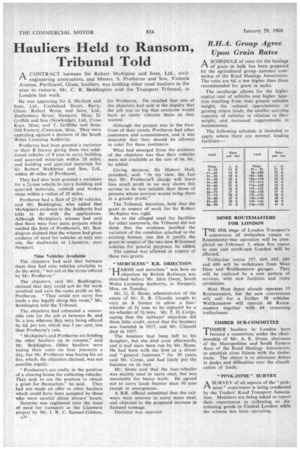Hauliers Held to Ransom, Tribunal Told
Page 32

If you've noticed an error in this article please click here to report it so we can fix it.
A CONTRACT between Sir Robert McAlpine and Sons, Ltd., civil
engineering contractors, and Messrs. S. Protheroe and Son, Victoria Avenue, Porthcawl, Glam, hauliers, was holding other road hauliers in the area to ransom Mr. C. R. Beddington told the Transport Tribunal, in London last week.
He was appearing for S. Harfoot and Sons, Ltd., Castleland Street, Barry, Glam; Robert Wynn and Sons, Ltd., Shaftesbury Street, Newport, Mon; D. Griffith and Son (Newbridge), Ltd., Cross Keys, Mon; and T. Griffiths and Sons, Old Factory, Cwmcarn, Mon. They were appealing against a decision of the South Wales Licensing Authority.
Protheroe had been granted a variation to their B licence giving them two additional vehicles of 8 tons to carry building and quarried materials within 20 miles, and building and quarried materials for Sir Robert McAlpine and Son, Ltd., within 40 miles of Porthcawl.
They had also been granted a variation for a 2-I-ton vehicle to carry building and quarried materials, rubbish and broken stone within a radius of 20 miles.
Protheroe had a fleet of 25-30 vehicles, said Mr. Beddington, who added that McAlpine's evidence to the Authority had little to do with the applications. Although McAlpine's witness had said that there were four main projects which needed the help of Protheroes, Mr. Beddington claimed that the witness had given evidence of need for vehkles at only one site, the steelworks at Llanwern, near Newport.
Nine Vehicles Available The objectors had said that between them they had nine vehicles available to do the work," but not at the terms offered by Mr. Protheroe."
The objectors, said Mr. Beddington, claimed that they could not do the work involved and earn the same profit as Mr.
Protheroe. They could not carry five loads a day legally along this route," Mr. Beddington told the Tribunal.
The objectors had estimated a reasonable rate for the job at between 8s. and 9e. a ton, whereas they were being offered 6s. 6d. per ton, which was 5 per cent. less than Protheroe's rate.
"McAlpine's and Protheroe are holding the other hauliers up to ransom," said Mr. Beddington. Other hauliers were basing their costs on four journeys a day, but Mr. Protheroe was basing his on five, which, the objectors claimed, was not possible legally.
" Protheroe's are really in the position of a clearing house for collecting vehicles. They seek to use the position to obtain a grant for themselves," he said. They had not made an offer to other hauliers which could have been accepted by those who were careful about drivers' hours.
Surprise was registered over the issue of need for transport at the Llanwern project by Mr. J. R. C. Samuel-Gibbon,
A30 for Protheroe. He recalled that one of the objectors had said at the inquiry that the job was so big that everyone would have as many vehicles there as they wanted.
Although the project was in the forefront of their minds, Protheroe had other customers and commitments, and it was desirable that they should be allowed to cater for these customers.
What had emerged from the evidence of the objectors was that their vehicles were not available at the rate of 6s. 6d., he added.
Giving decision, Sir Hubert Hull, president, said: "In my view, the fact that Mr. Protheroe' charge will leave him small profit in no way shows this service to be less suitable than those of persons whose services would bring them in a greater profit."
The Tribunal, therefore, held that the grant in respect of work for Sir Robert McAlpine was right.
As to the alleged need for facilities for other customers, the Tribunal did not think that the evidence justified the variation of the condition attached to the existing licence, nor did it justify the grant-in respect of the two new B-licensed vehicles for general purposes, he added.
The appeal was allowed in respect of these two grants.
" MERCILESS " B.R. OBJECTION " LIARSH and merciless" was how an 1 objection by British Railways was described before Mr. Idris Owen, South Wales Licensing Authority, at Newport, Mon, on Tuesday.
Mr. G. E. Stone, administrator of the estate of Mr. E. R. Clissold, sought to vary an A licence to allow a fourwheeler of 5+ tons to be replaced by a six-wheeler of 51 tons. Mr. T. D. Corpe, saying that the railways' objection did them little credit, stated that the business was founded in 1927, and Mr. Clissold died in 1957.
The business had been left to -his daughter, but she died soon afterwards, and it had since been run by Mr. Stone. He had been with the firm as a driver and "general factotum" for 30 years, said Mr. Corpe, and had lately put the business on its feet.
Mr. Stone said that the four-wheeler was mainly used to carry steel, but was unsuitable for heavy work. He agreed • not to carry loads heavier than 10 tons except in emergencies.
A B:R. official submitted that the railways were anxious to carry more steel, and objected to the proposed increase in licensed tonnage.
Decision was reserved






































































































